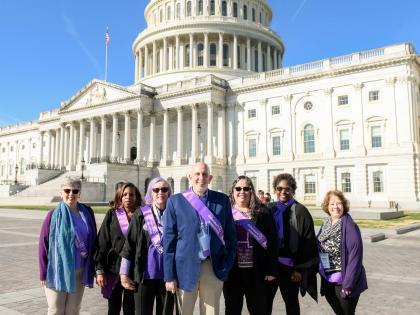North Carolina State Alzheimer’s Plan Overview

In 2014, language was included in North Carolina’s budget bill, Senate Bill 744, calling for the development of a state Alzheimer’s plan. In March 2015, the North Carolina Institute of Medicine convened a Task Force to develop an Alzheimer’s disease strategic plan at the direction of the state’s department of health. The Task Force included health care providers, advocates and other stakeholders who worked together to determine the needs of those living with Alzheimer’s and other dementias in the state. Dementia-Capable North Carolina: A Strategic Plan for Addressing Alzheimer’s Disease and Related Dementias was published in March 2016.
North Carolina 2026 Policy Priorities

Improve Access to Biomarker Testing
With the historic Food and Drug Administration (FDA) approval of treatments that slow the progression of Alzheimer’s in the early stages, early detection and diagnosis are even more critical to ensure individuals receive the most benefit at the earliest point possible. Biomarkers offer one of the most promising paths to improve dementia detection, diagnosis and treatment. Yet these critical tests remain out of reach for many as insurance coverage is failing to keep pace with innovations and advancements in treatments. The Alzheimer’s Association is urging state lawmakers to expand insurance coverage of comprehensive biomarker testing. Without this legislation, dementia diagnoses may take up to two years, increasing the long-term costs to the individual, family and the state.

Increase Funding for the North Carolina Registry for Brain Health
While many strides have been made to improve our understanding of dementia, significant work remains. The North Carolina Registry for Brain Health is the only state-funded Alzheimer’s Research Initiative in the state, connecting North Carolinians of all ages to clinical trials and research opportunities to improve brain health. The Alzheimer’s Association is calling on lawmakers to increase funding for the registry to $2 million per biennium to allow the North Carolina Registry for Brain Health to expand its research capacity, engaging more people in clinical trials.
Increase Respite Funding to Project C.A.R.E
More than 381,000 dementia caregivers in North Carolina provided 739 million hours in unpaid care in 2025, often enabling their loved ones living with dementia to live in the community instead of moving into more costly residential long-term care. Current state funding is inadequate to meet the existing needs of dementia caregivers, and this shortfall will only grow as the dementia population continues to increase in North Carolina. The Alzheimer’s Association is calling on state lawmakers to increase funding to $2 million for the state’s only dementia-specific respite program, Project C.A.R.E. This funding increase will allow the program to expand by adding additional host sites and respite care grants for caregivers.
North Carolina State Advocacy Day
Help us turn the North Carolina General Assembly purple for Alzheimer’s! Join us for Alzheimer’s Advocacy Day — the state’s largest event dedicated to driving legislative action on Alzheimer’s and dementia policy. Together, we’ll urge lawmakers to support measures that improve the lives of North Carolina families affected by this growing public health challenge. Don’t miss your chance to make an impact — sign up today!
Sign Up to Learn About Advocacy Opportunities in North Carolina

Find My Chapter
Together, we’re making an impact. Find an Alzheimer’s Association chapter in your community for more ways to engage.
Contact Us
State Affairs Contact: Lindsey Golden
Phone: 336.814.3723
Email: lagolden@alz.org
210,500
people living with Alzheimer’s in North Carolina
381,000
North Carolinians are providing unpaid care
$1.8 Billion
Medicaid cost of caring for people living with Alzheimer’s (2025)
147.7%
increase in Alzheimer’s deaths 2000-2022
17%
in hospice with a primary diagnosis of dementia
61.3%
increase of geriatricians in North Carolina needed to meet the demand in 2050
Resources to Drive Change in North Carolina
The following resources developed by AIM and the Alzheimer’s Association will help you learn more about the issues impacting people living with Alzheimer’s and their caregivers, how North Carolina policymakers are addressing these gaps, and how you can help drive change.